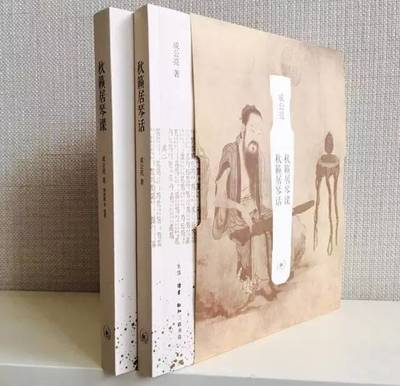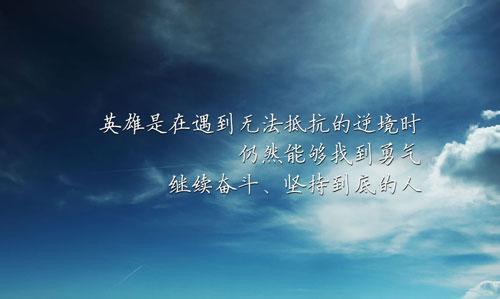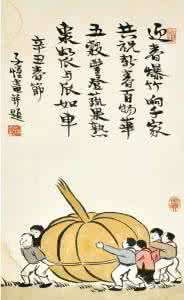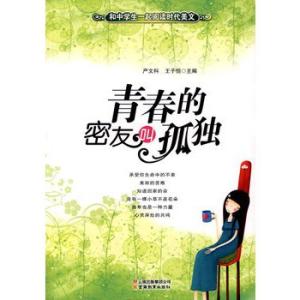成长路上所有的伤,时间替我抚平;成长路上所有的泪,时间替我擦拭;成长路上所有的疲劳,时间替我缓解……时间是我的依靠。小编整理了关于成长的经典英语美文,欢迎阅读!
关于成长的经典英语美文:Still Growing
成长不息
Sir Edmund Hillary is famous for being the first person to climb Mt. Everest.
埃德蒙·希拉里爵士是登上珠穆朗玛峰的第一人,他因此而闻名天下。
What many people do not know is that Sir Hillary did not make it to the top of Everest the first time he tried The first attempt was a complete failure. His climbing party encountered one problem after another and more than half his climbing party died.
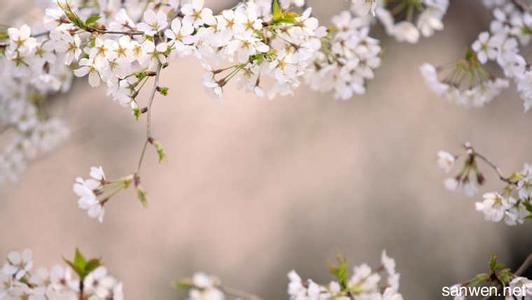
然而,很多人并不知道,希拉里爵士第一次试着攀登珠穆朗码峰时并未成功登顶。他第一次登山以彻底的失败而告终。他们接二连三遇到问题,登山队中超过半数的人都丧生了。
Nonetheless, the British Parliament decided to honor him with some type of award. When he entered the chamber to receive his award, Sir Hillary saw that a large picture of Everest had been set up.
尽管如此,英国议会还是决定授予他某种奖励。希拉里爵士走进议会大厅领奖时,看到里面竖着一幅很大的珠穆朗玛峰的画。
During the standing ovation that he was receiving, he walked over to the picture, shook his fist at it and said, "You won, this time. But you are as big as you are ever going to get. And I'm still growing."
大家起立热烈欢迎希拉里爵士,这时他走到画跟前,冲画挥动了一下拳头,说道,“你这次赢了。但是你就这么高,再也不会长,而我还在长。”
We frequently hear the stories of people who have succeeded. And we frequently assume that they succeeded the first time.
我们常常听到成功人士的故事。我们常常以为他们第一次就成功了。
But in fact it's the exact opposite.
但事实恰恰相反。
The road to success is paved with the bricks of failure.
成功之路是由失败之砖垫就的。
关于成长的经典英语美文:在工作中成长
To respect my work, my associates and myself. To be honest and fair with them as I expect them to be honest and fair with me. To be a man whose word carries weight. To be abooster(升压机,支持者) , not a knocker; a pusher, not a kicker; a motor, not a clog.
To base my expectations of reward on a solid foundation of service rendered; to be willing to pay the price of success in honest effort. To look upon my work as opportunity, to be seized with joy and made the most, and not as painful drudgery(苦工,苦差事) to be reluctantly endured.
To remember that success lies within myself; in my own brain, my own ambition, my own courage and determination. To expect difficulties and force my way through them, to turn hard experiences into capital for future struggles.
To interest my heart and soul in my work, and aspire to the highest efficiency in the achievement of results. To be patiently receptive of just criticism and profit from its teaching. To treat equals and superiors with respect, and subordinates(使服从) withkindly encouragement.
To make a study of my business duties; to know my work from the ground up. To mix brains with my efforts and use system and method in all I undertake. To find time to do everything needful by never letting time find me or my subordinates doing nothing. To hoard days as a miser does dollars, to make every hour bring me dividends in specific resultsaccomplished. To steer clear of dissipation and guard my health of body and peace of mind as my most precious stock in trade.
Finally, to take a good grip on the joy of life; to play the game like a gentleman; to fight against nothing so hard as my own weakness, and endeavor to grow in business capacity, and as a man, with the passage of every day of time.
关于成长的经典英语美文:Growing roots 成长的树根
When I was growing up, I had an old neighbor named Dr. Gibbs. He didn’t look like any doctor I’d ever known. He never yelled at us for playing in his yard. I remember him as someone who was a lot nicer than circumstances warranted.
When Dr. Gibbs wasn’t saving lives, he was planting trees. His house sat on ten acres, and his life’s goal was to make it a forest.
The good doctor had some interesting theories concerning plant husbandry. He came from the “No pain, no gain” school of horticulture. He never watered his new trees, which flew in the face of conventional wisdom. Once I asked why. He said that watering plants spoiled them, and that if you water them, each successive tree generation will grow weaker and weaker. So you have to make things rough for them and weed out the weenie trees early on.
He talked about how watering trees made for shallow roots, and how trees that weren’t watered had to grow deep roots in search of moisture. I took him to mean that deep roots were to be treasured.
So he never watered his trees. He’d plant an oak and, instead of watering it every morning, he’d beat it with a rolled-up newspaper. Smack! Slap! Pow! I asked him why he did that, and he said it was to get the tree’s attention.
Dr. Gibbs went to glory a couple of years after I left home. Every now and again, I walked by his house and looked at the trees that I’d watched him plant some twenty-five years ago. They’re granite strong now. Big and robust. Those trees wake up in the morning and beat their chests and drink their coffee black.
I planted a couple of trees a few years back. Carried water to them for a solid summer. Sprayed them. Prayed over them. The whole nine yards. Two years of coddling has resulted in trees that expect to be waited on hand and foot. Whenever a cold wind blows in, they tremble and chatter their branches. Sissy trees.
Funny things about those trees of Dr. Gibbs’. Adversity and deprivation seemed to benefit them in ways comfort and ease never could.
Every night before I go to bed, I check on my two sons. I stand over them and watch their little bodies, the rising and falling of life within. I often pray for them. Mostly I pray that their lives will be easy. But lately I’ve been thinking that it’s time to change my prayer.
This change has to do with the inevitability of cold winds that hit us at the core. I know my children are going to encounter hardship, and I’m praying they won’t be naive. There’s always a cold wind blowing somewhere.
So I’m changing my prayer. Because life is tough, whether we want it to be or not. Too many times we pray for ease, but that’s a prayer seldom met. What we need to do is pray for roots that reach deep into the Eternal, so when the rains fall and the winds blow, we won’t be swept asunder.
 爱华网
爱华网